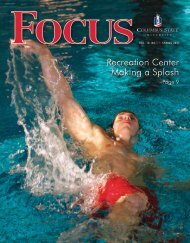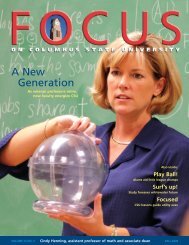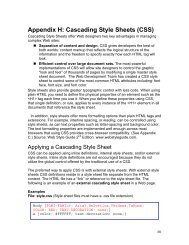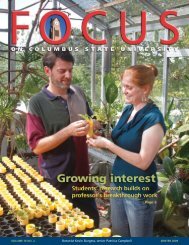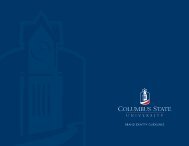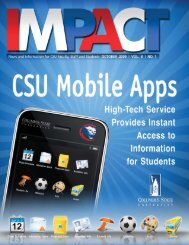CSU to Highlight Community Partnership March 21 - University ...
CSU to Highlight Community Partnership March 21 - University ...
CSU to Highlight Community Partnership March 21 - University ...
You also want an ePaper? Increase the reach of your titles
YUMPU automatically turns print PDFs into web optimized ePapers that Google loves.
Guiding <strong>CSU</strong>’s<br />
Nursing Program<br />
By April Davis<br />
The road <strong>to</strong> becoming an educa<strong>to</strong>r<br />
was an unexpected path<br />
for June Goyne. She discovered<br />
an early interest in science<br />
while in junior high school, but one<br />
particular event focused her attention<br />
on a career path that would lead<br />
<strong>to</strong> greater things.<br />
Inspired by the nurses who cared<br />
for her after an appendec<strong>to</strong>my at age<br />
13, she began working as a hospital<br />
volunteer. Her interest eventually led<br />
her <strong>to</strong> a bachelor’s degree in nursing<br />
from the <strong>University</strong> of Alabama in<br />
Birmingham.<br />
“I remember in nursing school, my<br />
classmates always wanted <strong>to</strong> study<br />
with me because they thought I was<br />
good at explaining things that we<br />
were learning. I was actually recruited<br />
in<strong>to</strong> teaching after working several<br />
years as a hospital RN by one of<br />
my favorite nursing instruc<strong>to</strong>rs.”<br />
Goyne added, “The transition had its<br />
challenges, and I had a lot <strong>to</strong> learn. I<br />
found myself taking every workshop<br />
I could find about teaching.”<br />
Her 34-year career has shifted<br />
between clinical practice as a nurse<br />
and teaching ever since.<br />
She began working in a neurosurgery<br />
unit in Birmingham and<br />
was later asked <strong>to</strong> teach clinical<br />
labs at the <strong>University</strong> of Alabama.<br />
She enjoyed teaching so much that<br />
she accepted a full-time position<br />
full-time at a community college<br />
and began work on her master’s<br />
degree at the <strong>University</strong> of<br />
Alabama in Birmingham. Around<br />
the same time, she joined an<br />
Alabama National Guard Field<br />
Hospital Unit and later moved <strong>to</strong><br />
active duty in the Army Nurse<br />
Corps, where she spent nine years.<br />
Over that period of time, she served<br />
as a clinical nurse on a medical sur-<br />
gical floor,<br />
as head<br />
nurse of a<br />
neurosurgical<br />
unit and<br />
later as<br />
head nurse<br />
in the emergency<br />
room.<br />
Her <strong>to</strong>ur of<br />
duty <strong>to</strong>ok<br />
her from<br />
Fort Sam<br />
Hous<strong>to</strong>n in<br />
Texas <strong>to</strong> Fort Campbell in<br />
Kentucky and finally <strong>to</strong> Fort<br />
June Goyne<br />
Professor of Nursing<br />
Benning, where she served as chief<br />
of the Medical Nursing Section at<br />
Martin Army <strong>Community</strong> Hospital.<br />
In 1992, after her husband retired<br />
from the military, she returned <strong>to</strong> the<br />
Army Reserves, and she and her<br />
family moved <strong>to</strong> Columbus, where a<br />
familiar experience awaited at <strong>CSU</strong>.<br />
“I came <strong>to</strong> <strong>CSU</strong> in 1992 <strong>to</strong> teach<br />
for one year,” she said. “My plan<br />
was <strong>to</strong> then return <strong>to</strong> clinical work,”<br />
she added. Nearly 15 years later,<br />
Goyne is still making strides both in<br />
nursing and education. Today, with<br />
an education doc<strong>to</strong>rate from Auburn<br />
<strong>University</strong>, she serves as both<br />
department chair and program direc<strong>to</strong>r<br />
of <strong>CSU</strong>’s nursing program —<br />
home <strong>to</strong> one of the university’s most<br />
popular majors. “We have nearly<br />
500 students in the pre-nursing program<br />
and 140 enrolled in upperlevel<br />
clinical nursing courses.”<br />
Thanks <strong>to</strong> grants and generous<br />
financial support from community<br />
hospital partners, the nursing program<br />
has grown extensively.<br />
“Unfortunately,” she said, “we still<br />
are unable <strong>to</strong> accept all qualified<br />
applicants in<strong>to</strong> the upper-level clinical<br />
track. Despite increasing our<br />
admissions <strong>to</strong> 90 in a class, we had<br />
36 qualified applicants we could not<br />
accommodate in the fall 2006 class.”<br />
Goyne also notes her program’s<br />
approval by the Georgia Board of<br />
Nursing, nationally accreditation by<br />
the National League for Nursing<br />
Accrediting Commission and a firsttime<br />
national licensing exam pass<br />
rate <strong>to</strong>pping 90 percent. “We, however,<br />
conduct ongoing quality improvement<br />
activities, researching ways <strong>to</strong><br />
improve the curriculum, the program<br />
and the department,” she said.<br />
Currently, Goyne’s faculty are<br />
preparing for a Georgia Board of<br />
Nursing site visit in the fall of<br />
2007, participation as a department<br />
in the <strong>CSU</strong> QEP plan and development<br />
of a “Student Success<br />
Program” designed <strong>to</strong> help students<br />
achieve higher levels of success.<br />
“This is a challenging program<br />
and we would like <strong>to</strong> see our graduation<br />
rate increase,” she said. “It is<br />
also essential for our students <strong>to</strong><br />
understand the amount of responsibility<br />
that comes with choosing this<br />
field of study. From the beginning,<br />
our department stresses lifelong<br />
learning because this profession has<br />
evolved rapidly and is steadily<br />
becoming more complex. We want<br />
our students <strong>to</strong> be prepared <strong>to</strong> meet<br />
and exceed those challenges.”<br />
Goyne said one such challenge is<br />
redesigning the program <strong>to</strong> emphasize<br />
“evidence-based” nursing practice<br />
in nursing.“There is a big gap<br />
between research and practice,” she<br />
said.“We want our students <strong>to</strong> leave<br />
our program with the knowledge and<br />
thinking skills needed <strong>to</strong> find the<br />
best evidence and research, critically<br />
appraise it, then apply it <strong>to</strong> practice<br />
<strong>to</strong> improve patient outcomes.”<br />
Reflecting on her career, Goyne<br />
said teaching wasn’t as unexpected<br />
a turn as she thought. “I enjoy<br />
working at <strong>CSU</strong>,” she said. “The<br />
philosophy of this institution and its<br />
emphasis on high standards in<br />
teaching and learning are exceptional<br />
values that inspired me <strong>to</strong><br />
remain at <strong>CSU</strong>.<br />
Goyne’s husband, Mike, is CEO<br />
of Magnolia Manor of Columbus.<br />
They have two children, Sara, 20,<br />
and Steven, 15.<br />
2 MARCH 2007



